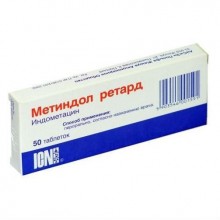



Metindol Retard has anti-inflammatory, analgesic and antipyretic effects.
The mechanism of action of the drug is associated with inhibition of the activity of the enzyme cyclooxygenase and a decrease in the synthesis of prostaglandins, causing the appearance of pain, an increase in temperature and an increase in tissue permeability in the inflammatory focus.
In articular syndrome, Methindol retard reduces inflammation and relieves pain at rest and on movement, reduces morning stiffness and swelling of joints, and contributes to an increase in the range of motion.
In 1 tablet of the prolonged action contains:
Active ingredient: indomethacin 75 mg.
Excipients:
Indomethacin is marketed under different brands and generic names, and comes in different dosage forms:
| Brand name | Manufacturer | Country | Dosage form |
|---|---|---|---|
| Metindol Retard | AiCn Polfa Rzeszow | Poland | pills |
| Indomethacin | VetProm AD | Bulgaria | ointment |
| Indomethacin | Biosynthesis | Russia | rectal suppositories |
| Indomethacin | Biosynthesis | Russia | ointment |
| Indomethacin | Berlin-Chemie/Menarini | Germany | rectal suppositories |
| Indometacin-Altfarm | Altfarm | Russia | rectal suppositories |
| Indowallier | Valeant | Russia | eye drops |
| Indomethacin | Sopharma | Bulgaria | ointment |
| Indomethacin | Sopharma | Bulgaria | rectal suppositories |
No customer reviews for the moment.
Metindol retard is taken orally, without chewing, during or immediately after a meal, drinking plenty of water or milk.
Adults: 1 or 2 pills per day, depending on the severity of the disease and individual sensitivity.
Do not exceed the dose of more than 150 mg per day.
Increases plasma concentration of digoxin, methotrexate and lithium preparations, which can lead to increased toxicity.
Ethanol, colchicine, corticosteroids and corticotropin increase the risk of gastrointestinal bleeding.
Enhances the hypoglycemic effect of insulin and oral hypoglycemic drugs; increases the effects of indirect anticoagulants, antiplatelet agents, thrombolytics (alteplazy, streptokinase and urokinase) - there is a risk of bleeding.
Reduces the effect of diuretics, with the use of potassium-sparing diuretics increases the risk of hyperkalemia; reduces the effectiveness of uricosuric and antihypertensive drugs (including beta-blockers); enhances the side effects of glucocorticosteroids, acetylsalicylic acid, estrogen, other NSAIDs.
Cyclosporine and gold preparations increase nephrotoxicity (obviously, due to the suppression of the synthesis of prostaglandins in the kidneys).
Cefamendol, cefaperazon, cefotetan, valproic acid, plicamycin increase the incidence of hypoprothrombinemia and the risk of bleeding.
Antacids and colestyramine reduce the absorption of indomethacin.
Enhances the toxicity of zidovudine (due to inhibition of metabolism); in newborns, it increases the risk of toxic effects of aminoglycosides (because it reduces renal clearance and increases blood concentration).
Simultaneous use with serotonin reuptake inhibitors increases the risk of gastrointestinal bleeding.
Myelotoxic drugs increase the hematotoxicity of the drug.
Combined use with paracetamol increases the risk of nephrotoxic effects.
Contraindicated.
During treatment, control of the pattern of peripheral blood and the functional state of the liver and kidneys is necessary.
If necessary, determine the 17-ketosteroids drug should be canceled 48 hours before the study.
For the prevention and reduction of dyspeptic symptoms, antacid drugs should be used.
Influence on ability to drive motor transport and control mechanisms
During the period of treatment, care must be taken when driving vehicles and engaging in other potentially hazardous activities that require increased concentration and psychomotor speed.
Symptoms: nausea, vomiting, severe headache, dizziness, memory impairment and disorientation. In more severe cases, paresthesias, numbness of the extremities and convulsions are observed.
Treatment: consists in the rapid elimination of the drug from the body and the use of appropriate symptomatic agents. Indomethacin cannot be removed from the body through hemodialysis.
Studies and clinical trials of Indomethacin (Click to expand)